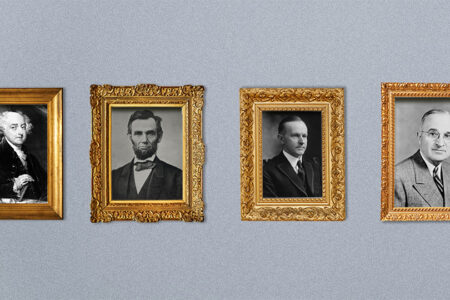Faithful in Service
2 Timothy 2:20–26
What is the church? Many people think of it solely as a building—sometimes a great and majestic cathedral and sometimes an unadorned, small, simple structure. Yet the New Testament church is neither.
Scripture teaches the true church is the body of Christ, people who have received Jesus Christ as Savior. The local congregation, however, contains both saved and unsaved people: genuine believers in Christ and individuals who are not. The two frequently mingle indiscriminately, and even the most discerning Christian cannot always detect the difference.
In 2 Timothy 2:20–26, the apostle Paul illustrated this point by speaking of the local church as a great house containing a variety of vessels, some honorable and others dishonorable; and he used the illustration to remind Timothy (and all believers) concerning the requirements for being a special vessel fit for the Lord’s use.
The Servant’s Cleanliness
Paul spoke of the church as a building to show what the visible church has become, using the metaphor of a “great house” or mansion:
But in a great house there are not only vessels of gold and silver, but also of wood and clay, some for honor and some for dishonor. Therefore if anyone cleanses himself from the latter, he will be a vessel for honor, sanctified and useful for the Master, prepared for every good work (vv. 20–21).
Historically, local churches started out small; but over time they grew into huge organizations, possessing members that are saved and unsaved. The vessels of “gold and silver” are vessels of honor, or true ministers of God; whereas the vessels of “wood and clay” are dishonorable or false teachers who must be purged from the congregation.
Conservative scholars disagree on whether verse 20 contrasts believers with unbelievers or dedicated believers with undedicated believers. The first position teaches the church grew enormously while housing both true and fake Christians. Jesus called the fakes “tares” sowed among good wheat (Mt. 13:24–30).
The second position maintains the passage refers to people professing to be Christians, like Hymenaeus and Philetus (2 Tim. 2:17–18), who were teaching false doctrine.
Both positions are correct. The universal church is composed of people who claim to be Christians but are not and people who promote false doctrine and thus are dishonorable vessels within the church. Because salvation comes to us by God’s grace through our faith and not through our good works, it seems Paul was referring to people who work for the Lord, not to personal salvation.
Therefore, Paul told Timothy to separate himself from false, heretical teachers, who are dishonorable vessels, thereby avoiding defilement of himself and the church.
This separation was not meant to be merely mental. It involved a flat-out refusal of fellowship. False teachers should not be allowed to speak in church or participate in evangelistic programs. By separating from them, Timothy would be “sanctified,” or set apart, “for the Master, [and] prepared for every good work” (v. 21).
The Servant’s Character
Timothy also was to be inwardly pure: “Flee also youthful lusts; but pursue righteousness, faith, love, peace with those who call on the Lord out of a pure heart” (v. 22). This was not a suggestion. It was a command.
The word lust refers to a passionate, inner yearning that can be good or bad, depending on the context. The word is not limited to sexual lust, as is often the case today. People can lust for wealth, power, and position and indulge themselves in pride, impatience, and selfishness. The command to “flee” did not imply Timothy showed weakness in such areas. Rather, Paul was reminding the young pastor in Ephesus to be on guard.
He also urged Timothy to cling to positive virtues that would strengthen his spiritual life. The word pursue implies acting with determination and strength, like a runner pursues the goal or a hunter his prey. We must live for eternal values, rather than earthly ones. Timothy was to pursue four well-known virtues:
→ Righteousness, or moral rectitude in character and conduct. We produce this virtue when we live each day according to Christ’s teaching, to the glory of God (1 Cor. 10:31; Col. 3:17).
→ Faith, better translated “faithfulness” or daily confidence and trust in God while we live in total dependence on Him.
→ Love (Greek, agape), the self-sacrificing love God manifests to believers through Jesus Christ. Jesus told His disciples, “A new commandment I give to you, that you love one another; as I have loved you” (Jn. 13:34). This commandment was new because it involved love on a much higher level and would require Jesus’ followers to love as He did.
→ Peace, serenity we have with God, manifested through harmonious relations with all people.
We are to be godly believers and “call on the Lord out of a pure heart,” one cleansed from daily sin and one that seeks direction from God and diligently practices these four virtues to glorify God.
The Servant Counseled
Paul then returned to his earlier counsel, telling Timothy not to become involved in word battles that lead to ungodliness: “But avoid foolish and ignorant disputes, knowing that they generate strife. And a servant of the Lord must not quarrel but be gentle to all, able to teach, patient” (2 Tim. 2:23–24).
Previously, Paul commanded him “not to strive about words to no profit, to the ruin of the hearers” (v. 14) and to “shun profane and idle babblings, for they will increase to more ungodliness” (v. 16) because they “spread like cancer” (v. 17).
Timothy was to refuse to answer “foolish” (Greek, moros) or moronic questions (v. 23) asked by people ignorant of biblical truth who were merely trying to trip Timothy up or were unwilling to seek answers through personal study.
Paul did not suggest Timothy refuse to answer sincere questions by people seeking honest answers. His counsel was intended to stifle disputes that only would produce strife, controversy, or quarreling in the church. Then the apostle gave Timothy the ultimate reasons for not striving with others:
A servant of the Lord must not quarrel but be gentle to all, able to teach, patient, in humility correcting those who are in opposition, if God perhaps will grant them repentance, so that they may know the truth, and that they may come to their senses and escape the snare of the devil, having been taken captive by him to do his will (vv. 24–26).
The word servant (Greek, doulos) refers to a bondservant and stresses the moral obligation to minister to others as Christ would. Paul often used the term to refer to himself and now used it to remind Timothy what his demeanor should be as a pastor. In fact, all Christian leaders should consider themselves bondservants. We are to manifest four attitudes regarding feelings and speech:
1. Be “gentle to all” (v. 24). We should control our dispositions and be mild, congenial, warm, and pleasant to those who oppose us and Christ’s teaching.
2. Be “able to teach” (v. 24). We should have the skill to impart biblical truth, counsel, and instruction.
3. Be “patient” (v. 24). We must not be bitter and indignant toward those who hate us.
4. Be humble (v. 25). “In humility,” we are to correct those who oppose us. The word humility implies meekness, not weakness. We are not to meet hostility with an attitude of superiority but, rather, with love, like we train or educate children, and without compromising the truth of God’s Word or what we believe. The goal is reconciliation, “if God perhaps will grant them repentance, so that they may know the truth” (v. 25).
Paul hesitated to be positive concerning repentance because false teachers often refuse to admit they are wrong. However, if they do repent, God is more than willing to “grant” repentance. This repentance hinges on heretics not only accepting the truth, but also being willing to follow Christ in newness of life.
Paul hoped such false teachers would come to their senses and escape the Devil’s snare, “having been taken captive by him to do his will” (v. 26). In other words, the Devil uses false teachers and people who teach biblical error, with the goal of keeping them captive to do his will as long as they live.
We should remember we all have ministries. Whether we speak from the pulpit, teach a Bible study, counsel people in God’s Word, or share the gospel, our goal should always be faithfulness in service for the Lord, using the gifts and opportunities He has given us.








